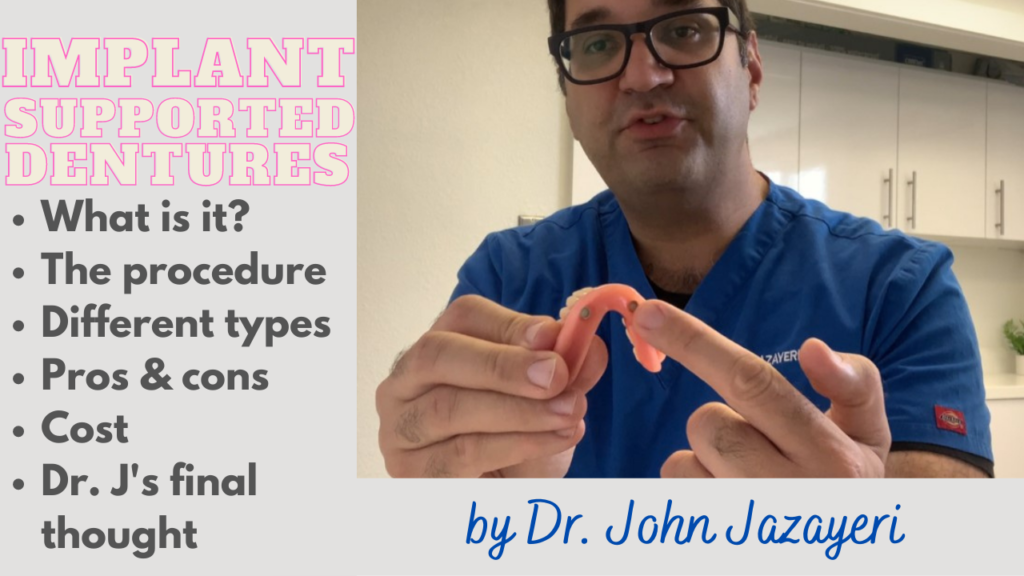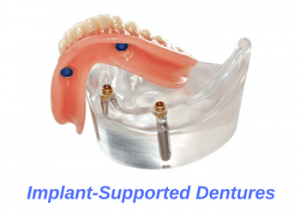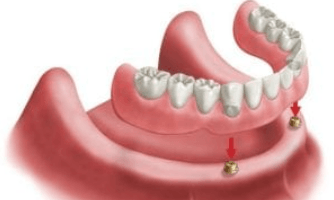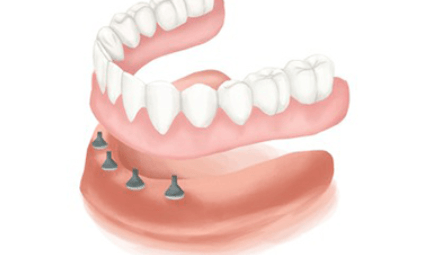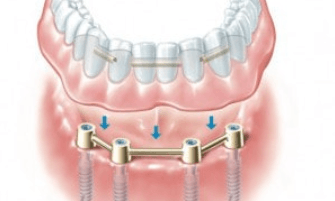Implant-supported dentures, also known as overdentures or snap-on-dentures, are dentures that anchor onto several dental implants. Partial dentures are supported by your remaining teeth. Once you lose all of your teeth, you're stuck wearing full dentures. The stability of full dentures comes from your gum tissue and remaining jawbone. Many patients find full dentures to be loose and uncomfortable. By adding just a few dental implants, you can lock dentures securely in place to improve their fit and stability. The addition of several dental implants improves your chewing efficiency. It also reduces pain and discomfort created by loose dentures. Finally, implant-supported dentures are designed to be slightly smaller than traditional full dentures, which further improves your comfort level.
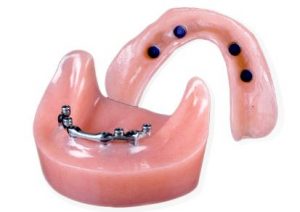
Implant-supported dentures offer an affordable solution to improve the fit and feel of your dentures
If you’re unhappy with your dentures then you're probably considering treatment options involving dental implants. Fixed solutions, such as all-on-four implants and full mouth dental implants, are expensive and extensive treatments. In contrast, implant-supported dentures offer a reasonable compromise. Adding a few dental implants improves the fit of your dentures without breaking the bank. By adding just a few dental implants you can stabilize your dentures and improve the fit and function. Implant-supported denture treatment is super simple and quick. Treatment usually takes just a few months, sometimes even weeks. Here are some additional benefits of implant-supported dentures:
Enhanced Denture Stability & Security
The main benefit of implant-supported dentures is the added security and stability of your false teeth. Dental implants stabilize your denture so that they don't move as much. You can eat and speak more comfortably with your snap-on-dentures. And yes, you can smile with more confidence without worrying about your teeth flying out accidentally!
Improved Chewing Capability

Dental implants provide anchors to hold your dentures in place and keep them from moving when eating
Implant-supported dentures are more stable than traditional dentures. The dental implants act as anchor points to fasten and secure your false teeth. This makes your dentures less likely to move and rock when chewing food. Snap-on-dentures are not as effective as natural teeth, but they are much better than full dentures. As a result, you can eat a larger variety of food objects with greater ease and comfort.
Less Pain & Discomfort
Full dentures are only supported by your remaining jawbone. As a result, many denture wearers find themselves constantly struggling with their false teeth. Wearing snap-on-dentures doesn't resolve all of these issues, however, it does make your dentures feel more comfortable in your mouth. Your dentures become more stable and cause less gum irritation and fewer sore spots. The best part is that with implant-supported dentures, you won’t have to use all that annoying denture cream ever again!
More Jawbone Preservation
A commonly overlooked benefit of implant-supported dentures is that they protect your valuable jawbone. Losing all of your teeth causes the jawbone to shrink rapidly. Without teeth, your jawbone goes into a state of accelerated atrophy. Typically, you lose jawbone three to four times faster as compared to when you had teeth. Adding dental implants reduces the pressure exerted onto the jawbone. This helps preserve your facial bone structure for better long-term results.
What are the different types of implant-supported dentures?
The difference in the types of overdentures primarily comes from the number of dental implants used to secure your dentures in place. You require a minimum of two dental implants per arch to support snap-on-dentures. However, some cases require additional implants to provide sufficient support. Here are a few of the most common types of implant-retained dentures you may come across:
Two Dental implants Plus Overdenture
The minimum number of dental implants required to fabricate implant-supported dentures is two implants. The two dental implants will be spaced out evenly, one on the right side and one on the left side. This provides for bilateral stability to keep the dentures in place during chewing and speaking. This treatment option provides the least amount of stability for your dentures. Dentures supported by two dental implants typically require annual visits to the dentist for maintenance. Your dentist will replace the rubbery connectors, known as O-rings, that attach the denture to the implants to enhance its retention.
Four (or More Dental) Implants Plus Overdenture
If you want your dentures even more secure, you have the option of adding more dental implants. Adding a 4th, 5th, or even 6th dental implant will give you double or triple the support as compared to a two-implant-supported overdenture. There are several advantages to adding a few dental implants to the design. First off, should one implant or connector become loose, you still have several implants to secure your denture in place. In contrast, with two dental implants if anything goes wrong you have to redo the entire treatment. Additionally, placing four or more implants allows your dentist to design a much smaller denture. Your dentist can remove a large portion of your denture to make it smaller and more comfortable. For example, if you place four or more implants in the top jaw, your dentist can remove the portion of the denture that covers the roof of your mouth. You really can't accomplish this with just two dental implants as the support from the roof of your mouth is still needed for denture retention. As you'd imagine, adding more dental implants also adds to your costs. You need to weigh the pros and cons of the additional implants to see what is the best solution for you and your mouth. Talk to your dentist to discover the best option is best for your needs.
Implant-Supported Bar Plus Overdenture
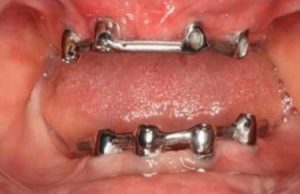
Implant-retained bar provides the most stability among all overdenture treatment options
The most stable overdenture solution is one that attaches to a denture-bar. Placing a denture bar requires anywhere between four to six dental implants. Implant-supported bars provide the highest level of stability among all removable treatment options. However, adding a denture bar makes your treatment costs skyrocket. In most cases, the cost of an implant-supported bar overdenture starts approaching the cost of all-on-four teeth. It might not be a bad idea to consider all-on-four teeth as an alternative whenever applicable.
Each snap-on-denture treatment option offers a varying degree of support and stability. They all come at significantly different price points as well as complexity levels. Schedule a consultation with a dental implant specialist near you to see which treatment option best suits your needs. Your dentist will evaluate your jaw size, arch curvature, bone quality, bite forces, diet, opposing teeth structure, etc. to determine which option is best for your needs.
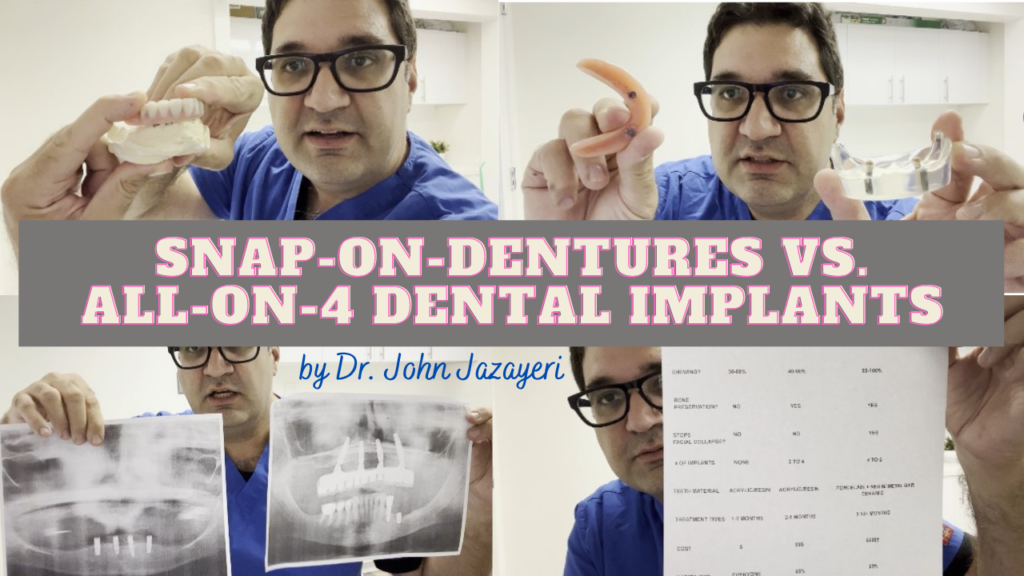
Implant-supported denture treatment in San Clemente, CA

Stop struggling with ill-fitting dentures and see if implant-supported dentures are right for you
If you'd like to learn more about your treatment options involving implants and dentures, request a complimentary consultation. Call (949)481-2540 or book your consult online today. Our dentist, Dr. Jazayeri, will present you with all suitable treatment options. We generally prefer to give your permanent teeth using all-on-4 dental implants and full mouth implants. However, there are scenarios where implant-supported dentures make sense and we will be glad to discuss them with you. We will work with you to come up with a treatment plan that suits your needs and fits your budget:
To learn more about implants and denture-related topics, click on the following links:
